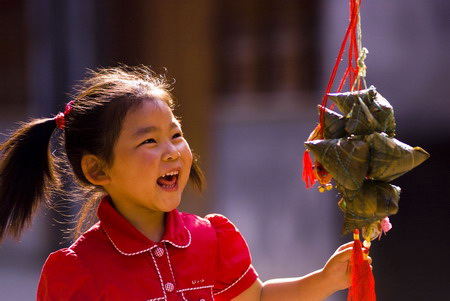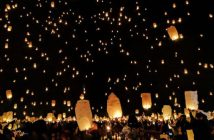Eating zhongzi and racing dragon boats might seem like the basic ritual to Dragon Boat Festival, but there is more than meets the eye to this Chinese holiday.
1. In Chinese, Dragon Boat Festival is called “Duan Wu Jie” meaning a holiday on the fifth day of the fifth month, in the Lunar Calendar. So there is no mention of the words, “dragon” or “boat” in Chinese.
2. Qu Yuan, a Chinese poet that lived in the state of Chu (present day Hubei) during the Warring States period in China, is famous for his contributions to the poetry collection known as Song Ci; Songs of the South. He is also the reason why Chinese people celebrate Dragon Boat Festival (according to common folklore). Legend has it that Qu Yuan cared much for his country and exploited the corruption behind the Emperor of the state of Chu. Legend has it that villagers carried dumplings and boats to the middle of the Miluo River after Qu Yuan jumped into the river, hoping that his death would shock the emperor into realizing the effect his corruption had over the state and his people. However, the villagers were too late. In order to keep fish and evil spirits away from his body, they beat drums, and splashed water with their paddles, throwing rice into the water as a food offering to Qu Yuan’s spirits, and to distract fish away from his body.
Not long after, late one night, Qu Yuan’s spirit appeared before his friends and told them to wrap their rice into three-cornered silk packages to ward off the dragon – what we know as zongzi. The rice is now wrapped in reed leaves instead of silk.
This act of racing to search for Qu Yuan’s body gradually became the tradition of dragon boat racing that is held on the anniversary of his death each year.
3. Countries such as Japan, Korea, Malaysia, and Vietnam also participate in this festival, as a process of cultural sharing. South Korea applied to UNESCO for their version of the Dragon Boat Festival to be listed as intangible cultural property, and they were successful. The application, sent by South Korea, was not well received by China.

4. The date-filled zongzi is the most common, but there are different styles of zongzi. Choose from small and big sizes, reed leaf or banana leaf wrappings. They are often filled with one of the following: dates, bean paste, or meat. They can be sweet (eaten with sugar) or salty. One thing is for sure though: They are easily devoured by children and adults of all ages.
5. Since summer has arrived, remember to keep the family safe from germs and diseases that thrive in the heat. Ai Cao (Moxa) is a medical herb that can be hung in the doorway to ward off evil spirits. Xiong Huang Jiu, a wine consisting of realgar, is also a medicinal drink. It is consumed during Dragon Boat Festival as a tradition. These two herbal elements will help support a stronger immune system, while you celebrate the holiday.
6. According to the lunar calendar, June is actually May, and is known as “A hundred toxins in a month”or “bai du yue” in Chinese. This is why Chinese believe it is a good time to cleanse the system and to pay careful attention in warding off diseases.
7. The Quyuan Theory: In the former territory of the state of Wu, the Dragon Boat festival commemorates Wu Zixu, a loyal advisor to the king. However, he was usually ignored by the king. King Fuchai forced him to commit suicide, and his body was thrown into the river on the fifth day of the fifth month. After his death, in Suzhou and other places, Wu Zixu is remembered on Dragon Boat Festival.
8. Dragon Boat Festival or Duan Wu Kie can also be called Nv Er Jie “Daughter’s Holiday.” Although the Qu Yuan Theory is popular in the Northeastern part of China (Shaoxing, Ningbo, Zhoushan), people commemorate Cao E instead. Cao E’s father, Cao Xu was a shaman in Zhejiang. In 143 CE, Cao Xu presided over a ceremony commemorating Wu Zixu and accidentally fell into the river. In an act of filial piety, Cao E followed her father into the river and searched for three days. On the fifth day, both were found dead in the river. Eight years later, a temple was built in Shangyu dedicated to the memory of Cao E and her act of filial piety. The tributary of Qiantang River is named after Cao E.
9. In Chinese folklore, Zhong Kui is an exorcist. Pictures of Zhong Kui are hung in the house to scare away evil spirits and demons.
10. Carrying a small spice bag will also drive away evil spirits and bring fortune and happiness to those who wear it.
This post first appeared on June 22, 2012
Photos courtesy of Tolbxela,




